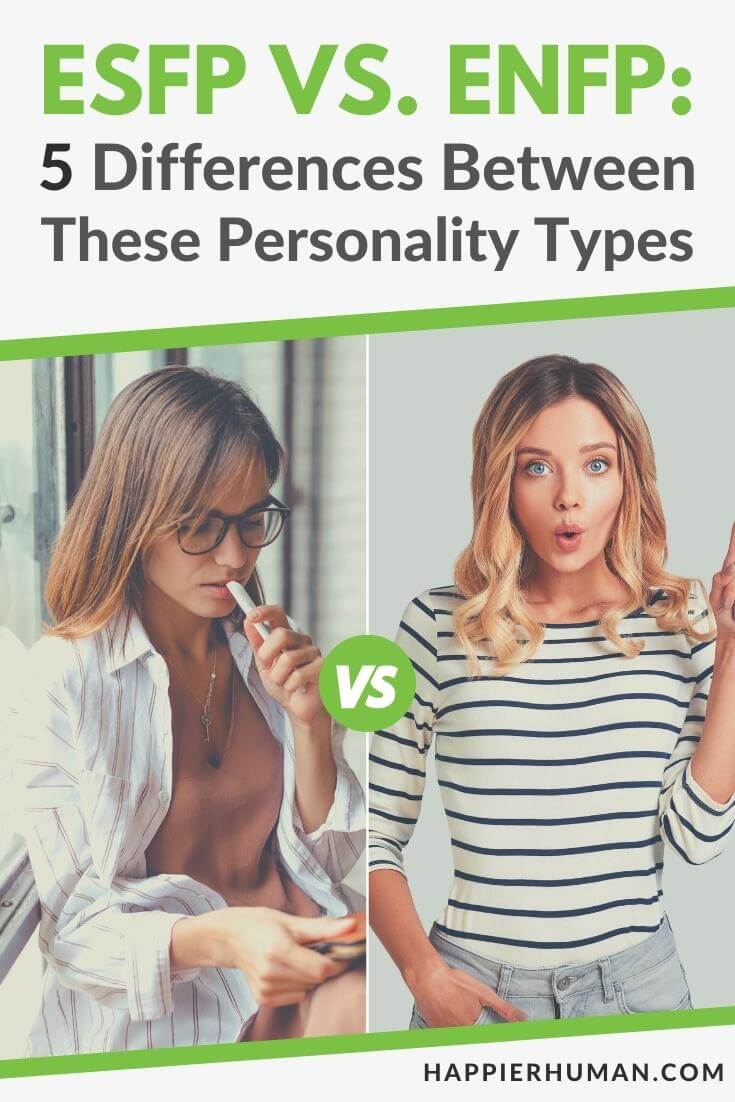Like most people, you know a few ESFP and ENFP personalities. Maybe you even are one yourself. These personality types are outgoing, energetic, and optimistic, easily making friends and connections everywhere.
However, despite their many similarities, there are some significant differences between ESFP and ENFP personalities, and they are worth understanding more deeply.
What Is the ESFP Personality Type?
The ESFP personality has the nickname of the Performer due to their ability to charm and engage a large number of people. The key characteristics of an ESFP are:
Extroverted
The first preference indicates where people tend to direct and receive their energy. Extroverts prefer to channel their energy outward toward people, activities, and sensations in the external world.
Extroverts are energized by activity and interactions with others. Extroverts discover their ideas and beliefs through their behaviors and sometimes act without planning.
Sensing
The second psychological preference indicates the way a person prefers to receive information. A sensing person pays attention to the information they receive through their five sense: taste, touch, smell, sight, and hearing.
They focus best on what is present, current, and real, noticing actual facts and remembering concrete details. They understand the practical use of things and learn through hands-on experience.
Feeling
The third preference indicates the way a person prefers to make decisions. A feeling person makes decisions by considering the perspectives and opinions of everyone involved and trying to create a harmonious outcome.
They want to deeply understand the feelings of the people around them and reach a peaceful resolution. Moreover, they know that no two different situations will have the same solution because other people and different feelings will be involved.
Perceiving
The final preference indicator refers to how a person deals with the outside world. A perceiving person prefers to remain flexible and spontaneous, allowing events to unfold around them.
They want to understand, adapt, and interact with the world rather than structure and control it. Therefore, they are casual about their activities, keep planning to a minimum, and keep their options open.
The ESFP is fun-loving, spontaneous, energetic, and enthusiastic. Their desire to have fun, enjoy the present moment, and be the center of attention makes
The Performer a natural entertainer. However, these personality types are also sensitive, caring, and supportive of friends and loved ones. They balance their spontaneity with practicality and their boldness with compassion.
What Is the ENFP Personality Type?
The ENFP personality is called the Campaigner. They are motivated by big ideas and ideals, filled with hope and optimism for the future. The ENFP preferences are:
Extroverted
The first preference indicates where people tend to direct and receive their energy. Extroverts prefer to channel their energy outward toward people, activities, and sensations in the external world.
Extroverts are energized by activity and interactions with others. Extroverts discover their ideas and beliefs through their behaviors and sometimes act without planning.
INtuiting
The second psychological preference indicates the way a person prefers to receive information. An intuiting person pays more attention to information patterns, impressions, and underlying meaning.

They learn by thinking things through and exploring the implications of new information. They mentally explore symbols, theories, and abstractions and remember ideas and concepts better than factual details.
Feeling
The third preference indicates the way a person prefers to make decisions. A feeling person makes decisions by considering the perspectives and opinions of everyone involved and trying to create a harmonious outcome.
Moreover, they want to deeply understand the feelings of the people around them and reach a peaceful resolution. They know that no two different situations will have the same solution because other people and different feelings will be involved.
Perceiving
The final preference indicator refers to how a person deals with the outside world. A perceiving person prefers to remain flexible and spontaneous, allowing events to unfold around them.
They want to understand, adapt, and interact with the world rather than structure and control it. Therefore, they are casual about their activities, keep planning to a minimum, and keep their options open.
A Campaigner is outgoing, optimistic, and energetic, eager to have a good time and work toward a greater purpose and impact on the world. They are imaginative, curious, enthusiastic, and charismatic.
They are also independent and willing to take risks, often innovators in their chosen field. The ENTP's great people skills and big goals make them inspiring leaders. Still, their creativity and flexibility sometimes distract them from new ideas and inspiration, and they struggle to follow through on plans and ideas.
What Do ESFP and ENFP Personalities Have in Common?
ESFP and ENFP personalities are lively, enthusiastic, and sociable, making friends easily and standing out in a crowd. These personalities share a lot of common characteristics, but the biggest ones are:
1. Fun Loving
ESFP and ENFP personalities love having fun and sparkling personalities that make ordinary activities more enjoyable. They love being around people, participating in group activities, and engaging in good times with others. Their spontaneous, vivacious personalities can make every day a party.
2. Easily Distracted
Neither ESFP nor ENFP personalities excel at structure, routine, or long-term planning. They are often caught up with enthusiasm in new ideas and new projects and dislike being bogged down in routine. These personality types are not the best at following through.
3. Over-Sensitive
Both ESFP and ENFP personalities are warm and caring and are very attuned to the emotions of others. Unfortunately, this means they are sensitive, often take things personally, and are easily hurt by small events.
Because ESFP personalities are so drawn to showmanship, they are strongly represented in the performing arts, with ESFPs like Serena Williams, Nicki Minaj, and Elvis Presley making huge impacts on culture. ENFPs like John Lennon, Ricky Gervais, and Charles Dickens showcase the social awareness of this personality type.
5 Key Differences Between the ESFP and ENFP Personality
Despite these strong similarities, there are some significant differences between ESFP and ENFP personality types. Here are the 5 key differences between them:
1. Personality type frequency
ESFP: 4-9% overall. ENFP: 6-8% overall.
Both personality types are relatively common in the US and are slightly more represented in women than men. Up to 10% of American women are either an ESFP or an ENFP.
2. Practical vs. Imaginative
Practical: ESFP. An ESFP prefers concrete, hands-on experiences with practical, real-world results. They don’t enjoy thinking about ideas and concepts that won’t have a practical, concrete outcome in their lives and want to engage in real-time activities. This focus on the present, tangible moment makes an ESFP a pragmatic problem solver.
Imaginative: ENFP. The ENFP personality enjoys thinking about concepts and ideas for their own sake, imagining how things might be or become, without requiring a real-world result for their thoughts. This makes them profoundly creative and innovative, even when their ideas aren’t always realistic.
3. Showmanship vs. Collaboration
Showmanship: ESFP. An ESFP seems to know instinctively how to put on a show, and this personality type loves being the center of attention. They tend to have a lot of charisma, style, and presence and feel comfortable when all eyes are on them.
Collaboration: ENFP. While an ENFP is also charismatic and outgoing, they tend to be more focused on building consensus and developing shared goals rather than having all the focus on themselves.
4. Present-Focused vs. Future-Focused
Present-focused: ESFP. The ESFP’s natural focus on the right-here, the right-now tangible world makes them focus on the present moment. They want to create positive, memorable experiences right now and shape their lives moment-by-moment.

Future-focused: ENFP. The imaginative ENFP tends to focus on the future, thinking of ways that things could be different and better, and working toward positive change.
5. People-Pleasing vs. Independent
People-pleasing: ESFP. The tendency for an ESFP to desire attention and approval, and their sensitivity to negative feedback or neglect, can make this personality type fall into becoming a people-pleaser.
When people try too hard to please others at the expense of their integrity and happiness, they can neglect their self-care and not set good boundaries for themselves.
Independent: ENFP. While an ENFP is sensitive and extroverted and cares about the opinions of others, they are more independent than the ESFP. This makes it easier for them to set boundaries, have difficult conversations, or be honest when they have an unpopular opinion.
The ESFP’s vibrant personality and natural sense of style and presentation give them an unforgettable impact on everyone around them. These personality types live life to the fullest, making the most of every moment.
On the other hand, an ENFP is more focused on collective goals, imagining a better world and trying to make it happen, but is also more independent and likely to go it alone.
Both are powerful personalities who attract attention and admiration with their charisma, charm, and warmth, making the world brighter and more interesting.
Final Thoughts on ESFP and ENFP Personalities
ESFP and ENFP personalities are highly charming and charismatic, and they bring fun and enjoyment to the lives of those around them.
As leaders, innovators, entertainers, and athletes, they make the world a better and more interesting place. While many of their external behaviors are different, they have many characteristics in common.
The MBTI and other personality types help us better understand ourselves and each other. To learn more about the 16 personalities, how they work, and how to communicate better with the people around you, check out our beginner’s guide to the Myers-Briggs Type Indicator.
Finally, if you want to identify YOUR personality type, then take one of these 11 personality tests to better understand what makes you tick.


